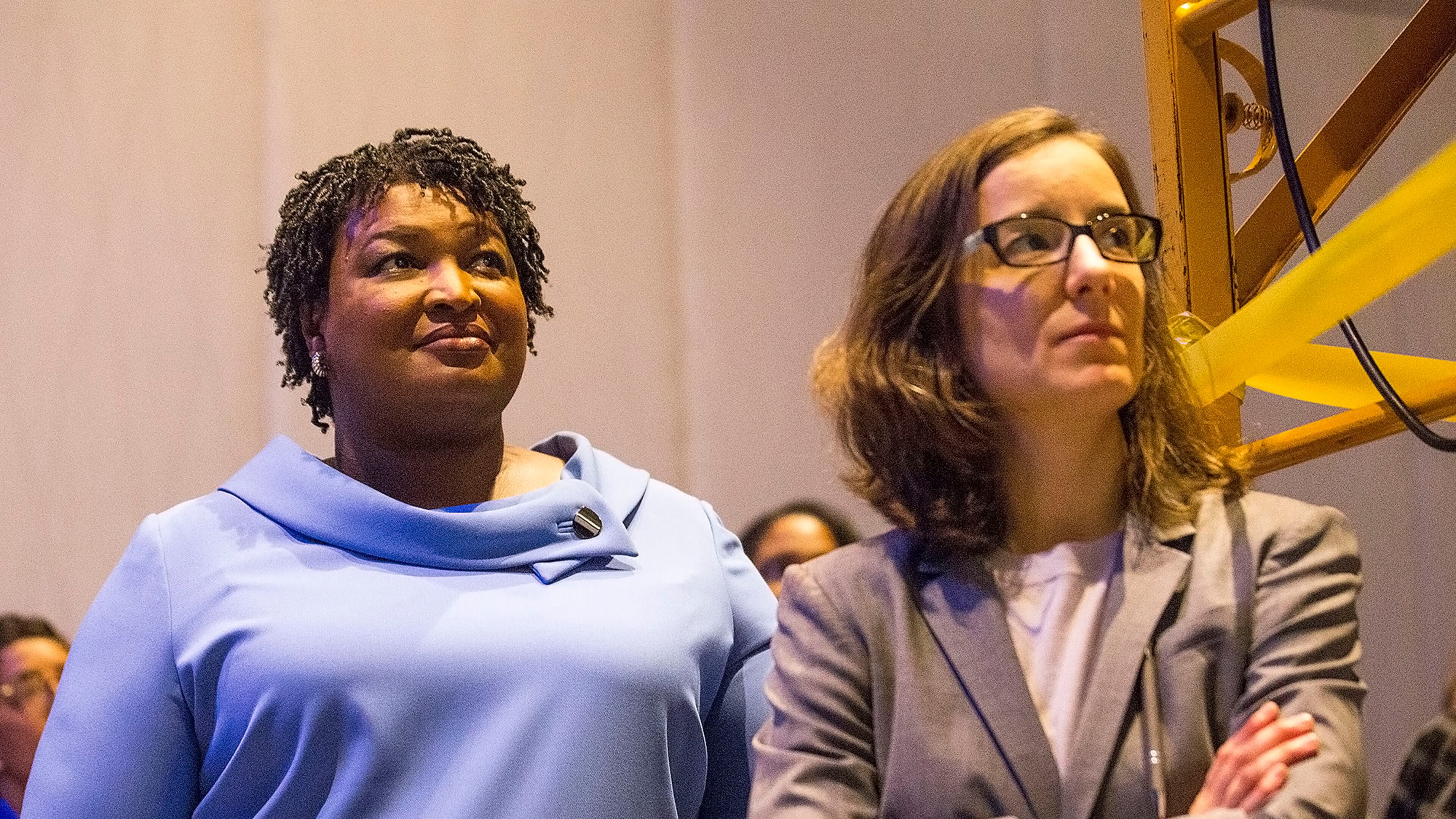OPINION: With Abrams aide’s tweets, Democrats’ wake-up call goes to voicemail

The 2022 elections should have been a wake-up call for Georgia Democrats after they lost eight of nine statewide races in November and saw the defeat of some of the party’s biggest, brightest stars.
With the notable exception of U.S. Sen. Raphael Warnock, Democrats lost by larger margins in 2022 than they did in 2018, but with more money, stronger candidates, and a growing Georgia population that is younger, more diverse, and more closely aligned with their politics.
But instead of self-reflection, Stacey Abrams’ campaign manager, Lauren Groh-Wargo fired off a bizarre, 52-tweet thread Wednesday night taking credit for Warnock’s win, and laying the blame for Abrams’ loss on Republicans, the media, and nearly everyone other than herself and Abrams.
The Twitter storm landed like a bomb with fellow Georgia Democrats, who were incensed by the suggestion that Abrams’ clunky campaign was not a part of the reason she lost, and incredulous that Groh-Wargo would suggest the Ebenezer pastor would never have been in the race without her and Abrams clearing the way.
“What’s the old saying, victory has a thousand fathers, or mothers in this case, and defeat is an orphan?” one Democratic donor said.
In Tweet #1, Groh-Wargo wrote that Abrams’ years of high-profile activism launched the careers of many in Georgia, but ultimately cost her the election in 2022.
Presumably, one of those careers was Warnock’s, because by Tweet #8, we learn that although Abrams was feverishly pursued by Sen. Chuck Schumer to run for the Senate in 2020, she turned him down. Instead, “she proposed an alternative leader who would stand up for all Georgians if elected, her friend Raphael Warnock.”
Tweet #9 tells us that Schumer “was disappointed,” but took her suggestion once Abrams promised to endorse Warnock quickly.
I should stop here to say that several Democrats close to Warnock told me today that he was approached by many people to run for the Senate in 2020, not just Schumer, and that his path to public service started much sooner, apart from Abrams.
But Tweet #12 notes that “Warnock wasn’t in politics” and thus didn’t have the political apparatus he needed, so Team Abrams came to the rescue. “I immediately dove in,” Groh-Wargo writes.
Ultimately, Abrams used her “time, talent, and organizations” to secure wins for President Joe Biden in 2020 and Warnock and Sen. Jon Ossoff in 2021.
But in Tweet #37, Groh-Wargo declares that the cost of Abrams’ good work was the damage to her own reputation, demolished by Republicans determined to stop her at any cost. Winning the 2022 race, she wrote, was “nearly impossible.”
“Brian Kemp remains Governor in part due to Stacey leaving it all on the field in the 2020 cycle.”
For as much as she covered in 52 tweets, Groh-Wargo also left key details of Abrams’ 2022 loss out of her thread, including choices by Abrams and Groh-Wargo that fellow Democrats say played a key role in Abrams’ demise.
For starters, the Abrams campaign itself was considered insular and intimidating. Decisions were made by a handful of people, including Abrams and Groh-Wargo, and other Democrats said they rarely raised disagreements for fear of retribution.
Even today, as Democrats flooded my inbox with reaction to Groh-Wargo’s tweets, most were loath to criticize her or Abrams publicly.
One declined to comment “because I’m color coding my bookshelves.”
Others spoke in detail but asked to remain unnamed because Abrams and Groh-Wargo, for now, remain supremely powerful in Georgia politics.
While they said Abrams rightly gets much of the credit for helping to make Georgia competitive in 2018 and beyond, her 2022 campaign was also riddled with self-inflicted wounds.
One was Abrams’ near total absence from Georgia during the years after losing in 2018. While she could be found on book covers and in television cameos, she rarely appeared publicly for Georgia issues or events.
In the same period, Abrams spoke out in the media as a private citizen in ways that came back to haunt her as a candidate.
One was her CNN interview saying she’d defund the police in certain circumstances. A local Democrat from Rome told me the interview came up again and again in his conversations with voters. “People want more police, not fewer,” he told me.
Another was her refusal to concede the 2018 race, which she defended over and over again. Not only did that play differently for voters after former President Donald Trump refused to concede his own 2020 loss, but as one Democratic operative told me this week, “She started from a place where she didn’t lose the last election, so why would she need to do anything different (in 2022)?”
On a broader scale, Abrams’ famous premise from 2018 that Democrats should focus only on left-leaning voters stood in stark contrast to the more expansive message operation that Warnock ran.
While Abrams’ team prioritized liberal voters over moderates, Warnock’s campaign never chose between the two. In the end, he finished five percentage points ahead of Abrams in November.
It’s not just Groh-Wargo whistling past 2022, of course. Ask most Georgia Democrats today why the party lost in November, and you’re likely to hear more blame for Brian Kemp than Stacey Abrams.
You’ll also hear that Democrats picked up seats in the state House and Senate, which they did, narrowly. Or that issues like democracy and abortion were important to voters, even if they didn’t make Democrats electable statewide.
In a nutshell, you’ll hear more finger-pointing than soul-searching, and that’s a problem for the party.
It’s rare to have two statewide races with such different strategies to compare and contrast, but between Abrams and Warnock, the senator’s campaign gave Georgia Democrats a roadmap for the future.
If 2022 was a wake-up call for the party, they should let Warnock answer next time around.



